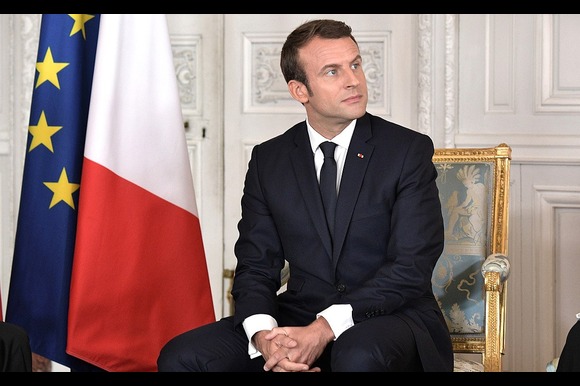Nuuk, Greenland – June 15, 2025 – In a clear sign of Greenland’s growing strategic importance, French President Emmanuel Macron arrived today in the Arctic island’s capital, Nuuk, marking the first-ever visit by a French president to the remote territory. Experts describe the visit as a bold demonstration of European solidarity and a direct message to U.S. President Donald Trump, whose recent statements about acquiring Greenland have raised international concern.
Macron’s arrival was met with cold, blustery weather, but warm enthusiasm from locals. Veteran Greenlandic official Kaj Kleist expressed the significance of the occasion: “This is big, I must say, because we never had visits from a president at all, and it’s very welcomed.”
Nuuk, a modest city with fewer than 20,000 residents, has rarely hosted an event of this scale, with a world leader’s arrival drawing public interest. Consultant and podcast host Arnakkuluk Jo Kleist noted, “I think that people will be curious, just hearing about it. I think they’ll be interested in what his message is going to be.”
She emphasized the broader implications of Macron’s presence: “He’s the president of France, but he’s also an important representative of Europe. It’s a message from the European countries that they’re showing support — that Greenland is not for sale — and for the Kingdom of Denmark.”
The French president is the first high-profile leader to visit Greenland under the invitation of newly elected Prime Minister Jens-Frederik Nielsen. Discussions between the two leaders are expected to focus on Arctic and North Atlantic security, climate change, economic cooperation, and access to critical minerals. Macron will continue on to the G7 summit in Canada following the visit.
Danish Prime Minister Mette Frederiksen, who is also participating in the meetings, hailed Macron’s presence as “another concrete testimony of European unity,” especially significant given recent tensions in international affairs. Greenland, an autonomous territory within the Kingdom of Denmark with a population of about 56,000, has found itself under increasing pressure from Washington. President Trump has repeatedly expressed interest in purchasing the mineral-rich island, citing U.S. national security concerns and refusing to rule out the use of force.
“Macron is not coming to Greenland just for Greenland’s sake,” Kleist pointed out. “It’s also part of a bigger game, among these big powers in the world.”
France was among the first to publicly rebuke Trump’s acquisition talk, even hinting at a military presence to support Greenland — a move ultimately declined by Denmark. Just last week, at the UN’s Oceans Conference in Nice, Macron firmly declared, “The ocean is not for sale, Greenland is not for sale, the Arctic and no other seas are for sale,” a statement quickly applauded by Prime Minister Nielsen.
In a Facebook post, Nielsen wrote, “France has supported us since the first statements about taking our country came out. It is both necessary and gratifying.”
The symbolism of Macron’s visit is not lost on analysts. Ulrik Pram Gad, senior researcher at the Danish Institute for International Studies, noted, “The vice presidential couple weren’t really able to pull it off,” referring to JD Vance and his wife Usha’s low-profile visit in March, which lacked major public interaction. “That, of course, sends a message to the American public, and to Trump,” Gad added, suggesting Greenland is pivoting more toward Denmark and the EU amid rising U.S. pressure.
Kleist agrees: “I think it’s a good time for Macron to come through here. They can talk about defence of the Arctic before the big NATO meetings… and hear what we are looking for, in terms of cooperation and investment.”
However, not all voices in Greenland’s political landscape are pleased with the optics. Opposition leader Pele Broberg welcomed the visit but critiqued its framework: “We welcome any world leader, anytime. Unfortunately, it doesn’t seem like a visit for Greenland this time. It looks like a visit for Denmark.”
Tensions between the U.S. and Denmark have steadily risen. During his recent trip to a U.S. military base in northern Greenland, Vice President JD Vance criticized Denmark’s underinvestment in the territory’s defence. Last month, Denmark’s foreign ministry summoned the U.S. ambassador after reports emerged that American intelligence agencies had been instructed to intensify surveillance efforts in Greenland.
Further intensifying the rhetoric, U.S. Defence Secretary Pete Hegseth appeared at a congressional hearing last Thursday and, under pressure, acknowledged the Pentagon had drawn up “contingency” plans to take Greenland by force “if necessary.”
Meanwhile, Denmark is walking a fine line. Its parliament recently approved a controversial bill permitting the stationing of U.S. troops on Danish soil and allocated an additional $1.5 billion (approx. £1.1 billion) to bolster Greenland’s defence. Over the weekend, military activities around Nuuk increased noticeably, with Danish naval frigates patrolling local fjords and helicopters seen circling overhead.
According to Gad, this reflects a broader policy shift: “Denmark has been reluctant to make this shift from having a very transatlantic security strategy to a more European strategy,” but that stance appears to be evolving. The European Union is also stepping up its Arctic involvement. Earlier this month, the EU signed a deal to invest in a graphite mine in Greenland — a critical component in battery production — as part of a broader push to reduce dependency on China and secure mineral supplies amid Russia’s ongoing war in Ukraine.
Marc Jacobsen, associate professor at the Royal Danish Defence College, underscored the wider implications of Macron’s visit: “This is about, of course, the changed security situation in the North Atlantic and the Arctic. It’s a strong signal. It will show that France takes European security seriously.”
For Greenland, the message is clear — global powers are watching, and the stakes are higher than ever.






